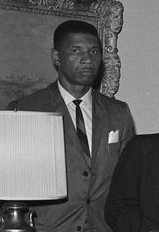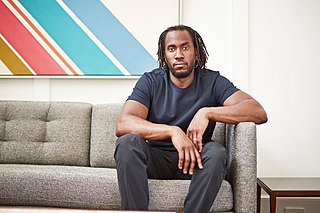A Quote by Medgar Evers
When a black Jacksonian looks about his home community, he sees a city of over 150,000, of which 40% is Negro, in which there is not a single Negro policeman or policewoman, school crossing guard, or fireman.
Related Quotes
I maintain that I have been a Negro three times--a Negro baby, a Negro girl and a Negro woman. Still, if you have received no clear cut impression of what the Negro in America is like, then you are in the same place with me. There is no The Negro here. Our lives are so diversified, internal attitudes so varied, appearances and capabilities so different, that there is no possible classification so catholic that it will cover us all, except My people! My people!
Alpha Phi Alpha, the oldest of Negro Fraternities, with all of its members presumably far above the average American and having a good practical understanding of the salient factors involved in the Negro's problem, and which a membership upwards of eight thousand men, should be able to take into their hands the leadership in the Negro's struggle for status.
Negro writers, just by being black, have been on the blacklist all our lives. Do you know that there are libraries in our country that will not stock a book by a Negro writer, not even as a gift? There are towns where Negro newspapers and magazines cannot be sold except surreptitiously. There are American magazines that have never published anything by Negroes. There are film studios that have never hired a Negro writer. Censorship for us begins at the color line.
What the Negro wants - and will not stop until he gets - is absolute and unqualified freedom and equality here in this land of his birth, and not in Africa or in some imaginary state. The Negro no longer will be tolerant of anything less than his due right and heritage. He is pursuing only that which he knows is honorably his. He knows that he is right.
We should emphasize not Negro History, but the Negro in history. What we need is not a history of selected races or nations, but the history of the world, void of national bias, race, hate, and religious prejudice. There should be no indulgence in undue eulogy of the Negro. The case of the Negro is well taken care of when it is shown how he has far influenced the development of civilization.
A story went the rounds about a San Franciscan white matron who refused to sit beside a Negro civilian on the streetcar, even after he made room for her on the seat. Her explanation was that she would not sit beside a draft dodger who was a Negro as well. She added that the least he could do was fight for his country the way her son was fighting on Iwo Jima. The story said that the man pulled his body away from the window to show an armless sleeve. He said quietly and with great dignity, "Then ask your son to look around for my arm, which I left over there.
In the early days of my carer as an actor, I shared what was then the prevailing attitude of Negro performers :;that the content and form of a play or a film scenario was of little importance to us. What mattered was was the opportunity, which came so seldom to our folks ... Later I came to understand that the Negro artist could not view the matter simply in terms of of his individual interests, and that he had a responsibility to his people who rightfully resented the traditional stereotyped portrayals of Negros on stage and screen.

































